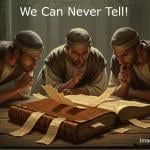Welcome readers! Please subscribe through the button on the right.
(Read this series from its beginning here.)

All of this meant the people were heavily economically oppressed. Not only did Rome tax the people through Herod and the Temple High Priest, but Herod also heavily taxed the people for expensive building projects to honor Caesar and to fund his reign of terror, which kept the populace in line and prevented rebellions. On top of this, the Temple itself demanded tithes and offerings. Instead of being a kind of wealth redistribution to the poor, these tithes and offerings tended only to make the wealthy elite richer.
It is in this context that we must understand the image of throwing a mountain into the sea. In the prophetic tradition, mountains represented political and social orders. In the gospels, the mountain being thrown into the sea was associated with the Temple State, which had become a proxy for Rome when, after Herod’s death, Rome began directly determining who the priests and the High Priest would be. Talking about throwing a mountain into the sea in that era would have been associated with the oppressive social, economic, and political system represented by the temple mount rulers in the hilly city of Jerusalem.
To quote Horsley again:
“The high priests are hardly ‘Jewish leaders.’ [Editor’s note: Horsley is not implying that the leaders were not Jewish ethnically. He’s suggesting that they represented the interest of Rome, not of Jewish liberation or independence from Rome.] . . . Neither in this episode nor in Mark as a whole is there any suggestion of the replacement of ‘Judaism’ by ‘Christianity.’ . . . Here, as throughout Mark’s story, the fundamental conflict lies between rulers and ruled, not ‘Judaism’ and ‘Christianity.’” (Richard A. Horsley, Jesus and Empire: The Kingdom of God and the New World Disorder, Kindle Locations 1203-1207)
In his insightful commentaries, Ched Myers agrees that the metaphor of throwing mountains into seas referred to Roman oppression, directly or indirectly through the Temple state acting as a Roman client.
“As impossible as it may seem, Mark insists that the overwhelming power and legitimacy of both the Roman ‘legion’ and the Jewish ‘mountain’ will meet their end—if the disciples truly believe in the possibility of a new order.” (Ched Myers, Binding the Strong Man, p. 305)
“Faith is here defined as the political imagination that insists on the possibility of a society freed from the powers, whether Roman militarism or the Judean aristocracy.” (Ched Myers, Say to This Mountain”: Mark’s Story of Discipleship, p. 149)
In the same way that peasants could not imagine a world without feudalism, we today find it difficult to imagine a world without capitalism, and Jesus’ followers could not imagine a world without Roman imperial rule.
Some in Jesus’ audience that day didn’t want a world without Roman imperial rule, much as capitalists today who benefit from capitalism therefore defend the way things are. The wealthy elite in Jesus’ audience were benefitting from Roman rule, and it’s to them that Jesus’ next words are aimed.
(Read Part 3)













